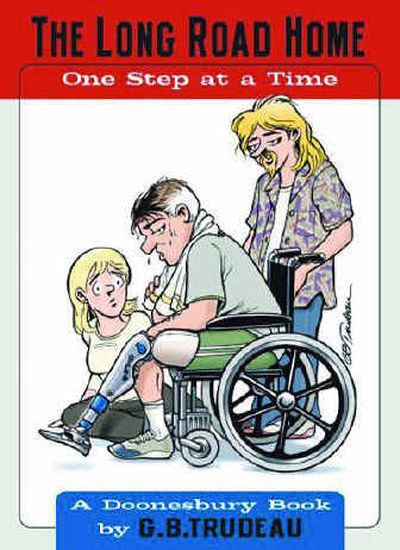B.D. returns from war

Because of the “Doonesbury” comic strip, millions of Americans have a face for the thousands of injured soldiers back from Iraq struggling to reassemble their lives.
He’s B.D., the long-running cartoon character who went to Iraq as a National Guardsman and lost a leg when a rocket-propelled grenade struck his Humvee.
Now B.D. also is appearing in a new book aimed at helping real soldiers and their families.
“The Long Road Home: One Step at a Time” (96 pages, $9.95), from Andrews McMeel Publishing and “Doonesbury” creator Garry Trudeau, is a collection of strips portraying B.D.’s postwar experience.
Money from sales of the book will go to Fisher House Foundation, a network of family support centers for injured soldiers. Trudeau will forgo all proceeds, and Andrews McMeel will contribute 10 percent of its share of the profits.
Since the “Doonesbury” story line began in March 2004 in 1,400 daily newspapers, readers have followed B.D. – never previously seen without some kind of helmet, whether for football, the highway patrol or the Army – as he and his family and friends cope with his injury and its effect on their lives.
In the story, B.D. and his wife, Boopsie, spend awhile recovering from his war wound at the Fisher House at Walter Reed Army Medical Center in Washington.
“What Garry has done was really capture the essence of what we knew to be the patient’s perspective,” said James Weiskopf, vice president of Fisher House. “We were touched by it. What he had was amazingly accurate.”
Fisher Houses are at 33 military and veterans’ hospitals throughout the country and in Germany. Funded primarily by private donations, the nonprofit project provides temporary housing for families of injured soldiers during their hospital stays.
Since 1990, more than 65,000 families have been helped, including 8,500 last year. The average charge is less than $10 a day, though many offer rooms at no cost.
“We’re the military equivalent of the Ronald McDonald House,” Weiskopf said.
The book project came about when Fisher House officials met Trudeau during his visits to Walter Reed to research the story line about B.D.
He spent time with the amputees in Ward 57, their families and caregivers, hearing the stories and soaking up the atmosphere of pain, anger and bravery.
“Nobody who visits the troops on Ward 57 and elsewhere comes away with anything but awe over the courage with which these mangled men and women face the staggering array of challenges they’re presented with every day,” Trudeau said in an e-mail interview.
“There’s almost no self-pity in evidence. It takes your breath away.”
He even used by name one of the soldiers that he met. In one strip from last year that appears in the book, B.D. points to an injured soldier and tells his friend, Zonker, that his name is “Sgt. Jason Pepper.”
“Sgt. Pepper? For real?” Zonker asks.
“Yup,” B.D. says, “and he is, in fact, guaranteed to raise a smile.”
Pepper, from New Jersey, was blinded and suffered other injuries last May when a rocket-propelled grenade struck his vehicle in Karbala. He was awarded the Purple Heart and the Bronze Star with Valor.
Erin Friedrich, a senior editor at Andrews McMeel, said she was surprised that Trudeau – someone viewed as “anti-establishment” – and former soldiers such as Weiskopf could find common ground.
While Trudeau has been a public opponent of the Iraq war, Pentagon spokesman Jim Turner praised his efforts on behalf of Fisher House as “very patriotic and to be commended.”
Republican Sen. John McCain of Arizona, a staunch defender of the war, wrote the book’s foreword.
“Like B.D., the thousands of soldiers who have left their health or their limbs on the battlefield have done so in the service of all of us,” McCain wrote.
Trudeau said that he chose the story line about B.D. because as casualty counts soared last year, he wanted to “dramatize the sacrifices” of the troops.
More than 1,630 troops have been killed in Iraq since March 2003. More than 12,300 have been injured, many of them seriously.
In May 2004 and again last Sunday (continuing today), Trudeau devoted entire Sunday strips to publishing the names of Iraq casualties.
“Injuring B.D. was a way of keeping the focus on the travails of a wounded warrior over a sustained period of time, something conventional journalism has difficulty doing,” Trudeau said. “No matter where you stand on this war, averting your eyes from its terrible cost is unconscionable.”
In the comics collected for the book, he said, he largely avoided politics to keep the focus on B.D.’s sacrifice.
In one panel, B.D.’s nurse asks him if he wants to do a “balcony wave” since he’s a famous football coach.
“Tell them I’m no celeb, amputee or not,” B.D. says.
“That you put your pants on one leg at a time, etc.?” the nurse cracks.
Ryan Kelly, a 24-year-old former Army Reserve staff sergeant housed on Ward 57 at the time Trudeau was doing his research, said that the cartoonist accurately parodied scenes that played out in his family and others.
Like the time B.D. is complaining to a fellow amputee about “clueless visitors” and the soldier tells him that family and friends, too, are making an adjustment but will soon go back treating him normally.
“Hey moron! You forgot your meds!” yells a voice from an unseen character.
“Take my mom …” the soldier says.
“Everyone feels like they have to be real somber,” said Kelly, who lost a leg from a roadside bomb. “It only took my mom about two weeks to get over the motherly, sympathy thing.”
Andrews McMeel’s Friedrich said realism was paramount to Trudeau because the subject was so important.
“Granted, it’s a cartoon character,” she said, but the book was “one of the most important things I feel I’ve ever worked on.DoCart